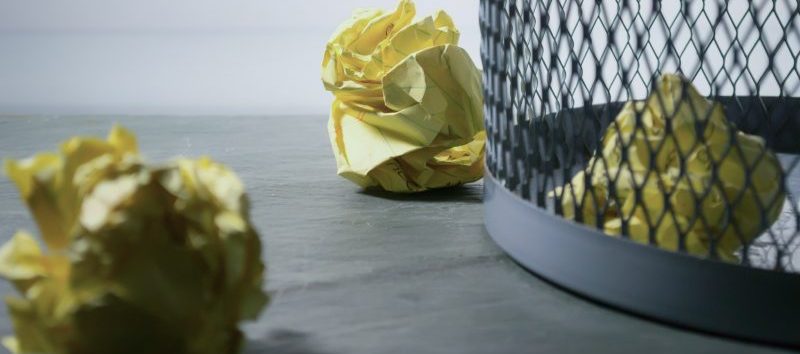Every one of us makes mistakes at work. Let that sink in. Every single one of us! But mistakes don’t have to derail your career. In fact, a mistake can only defeat or define you if you allow it to.

In my almost 34 years of government service, I’ve made boo-boos Some small, some big. No one wants to make a mistake; it happens, though. So, how do you recover from a misstep? And, how do you figure out the “why” behind making the mistake? Both are important in truly dealing with the situation and preventing mishaps in the future.
I remember a mistake I made early on in my leadership journey — in my very first manager position. I was a young frontline manager with a team of more senior (age and experience) employees. One employee tended to stir up trouble among the team members. I confronted him about a negative situation he caused while he was sitting at his desk. I was frustrated and reactive. As I walked away from his desk, I muttered something negative about him under my breath. BIG MISTAKE.
This was a mistake, not just because he heard it, but because I did it. I compounded the mistake by not immediately apologizing to him. I walked into my office and worried about what happened. I worried that night, the next day and the day after until I received a phone call from my boss. He shared that the employee and union steward raised the issue to him. My boss wanted to talk to me about the situation. I thought I was done as a manager.
Long story short (some of you may say I already missed the bus on making this story short), my boss and I talked about what happened. He shared what the employee wanted — an apology in front of the entire team. I agreed but was nervous. I knew the apology was the right thing to do, but I was embarrassed and thought it would “show” my inexperience and make my team think less of me.
Boy, was I wrong. The employee and my team were grateful for my genuine apology. We started to communicate more honestly and openly. I began to realize I didn’t have to prove I was the boss and always right.
I also learned an important lesson, in that my supervisor didn’t hold this against me. He didn’t bring it up in conversation nor in my appraisal. As I apologized and worked on improving my relationship with that employee (and the team), he remained supportive and encouraging. I apologized to him for causing the situation and shared what I learned from it. It truly was a great learning lesson.
Ultimately, mistakes don’t have to define you. Mistakes can make you better.
Dawn Graham, a Forbes Contributor, shares six to recover from a major mistake at work:
- Don’t catastrophize. In my story, my “worst-case scenario” was so much bigger than the reality. Take a deep breath. Talk to a mentor. Give yourself a chance to see the world won’t end.
- Own it. I failed to do this. I just sat there waiting to hear if something was going to come out of my mistake. Not only did this prolong my anxiety, but I also made the situation look worse than need be.
- Make amends. Ensure you are being genuine and authentic in apologies or whatever you are doing to correct the mistake.
- Assess the bigger picture. I had to figure out the “why” behind me making the snarky comment under my breath. What made me act out of character? As I thought it through, I was going through a divorce. I was very stressed. I reached out to our Employee Assistance Program for some counseling as this mistake helped me see I wasn’t handling things as well as I told myself I was.
- Be patient. I was fortunate my boss was empathetic and supportive. Other supervisors may not have been. Share with your supervisor if there were other circumstances, such as stress from a year-long pandemic, children learning from home, etc. Explain how you are trying to deal with the extra anxiety or issues.
- Remember, you’re human. The mistake is an error. It didn’t define me, and your error shouldn’t define you. If you need to move on from your position, that’s difficult. But understand, only you can make that mistake define you and your future.
Mistakes will happen. They can be amazing leadership and learning lessons. My mistake shared above truly changed me. Do I still make mistakes? You bet! Have I tried to put things in place to help me recognize my hot buttons? Yes. Do I still use EAP or others to help deal with the anxiety and stress in this world – YOU KNOW IT!!!
Don’t allow a mistake to stop you from being an amazing you. You will survive, and you will prosper.
Interested in becoming a Featured Contributor? Email topics you’re interested in covering for GovLoop to [email protected]. And to read more from our Winter 2021 Cohort, here is a full list of every Featured Contributor during this cohort.
Rebecca (Becky) Mack Johnson’s government career spans almost 34 years. She’s been an SES executive for over 15 years. Her leadership experiences range from business operations’ positions to the human capital side of the house. Becky’s passion centers around helping people grow and achieve their goals. Becky considers receiving the Treasury Department’s Leadership Legacy Award in 2017 as one of her greatest accomplishments. Becky believes continual learning is essential. To practice what she preaches, Becky completed her Masters Degree in Strategic Public Relations in her early 40s. She is also an International Coaching Federation ACC certified coach and a Project Management Professional.





Thanks for sharing your story, it was super helpful to putting mistakes into perspective!